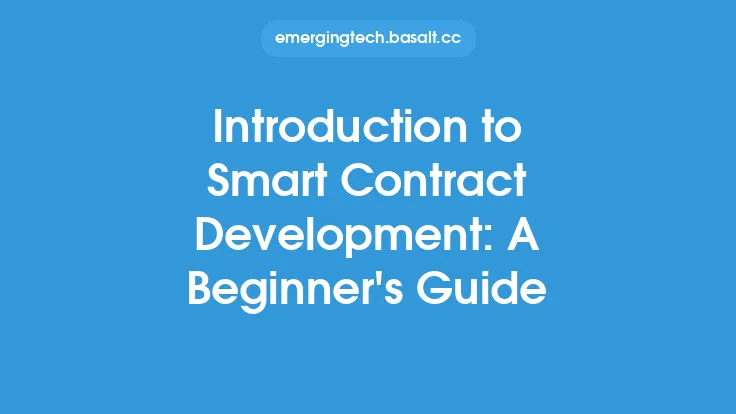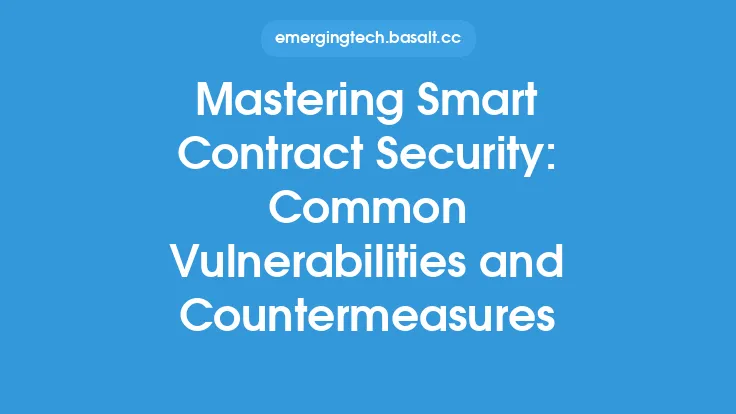The development of smart contracts has become a crucial aspect of blockchain technology, enabling the creation of self-executing contracts with the terms of the agreement written directly into lines of code. As the demand for smart contracts continues to grow, the need for efficient and reliable development frameworks has become increasingly important. In this article, we will delve into the world of smart contract development frameworks, exploring the most popular and widely-used tools, including Truffle, OpenZeppelin, and others.
Introduction to Smart Contract Development Frameworks
Smart contract development frameworks are designed to simplify and streamline the process of building, testing, and deploying smart contracts on various blockchain platforms. These frameworks provide a set of tools and libraries that enable developers to write, compile, and deploy smart contracts with ease, while also ensuring the security, scalability, and reliability of the contracts. By using a development framework, developers can focus on writing the logic of the smart contract, rather than worrying about the underlying complexities of the blockchain platform.
Truffle: A Popular Smart Contract Development Framework
Truffle is one of the most widely-used smart contract development frameworks, providing a comprehensive set of tools for building, testing, and deploying smart contracts on the Ethereum blockchain. Truffle allows developers to write smart contracts in Solidity, a programming language specifically designed for Ethereum, and provides a suite of tools for compiling, testing, and deploying contracts. Truffle also includes a built-in migration system, which enables developers to manage the deployment of contracts across different environments, such as testnets and mainnets.
OpenZeppelin: A Framework for Secure Smart Contract Development
OpenZeppelin is a framework designed specifically for building secure smart contracts on the Ethereum blockchain. OpenZeppelin provides a set of reusable and modular contracts, known as "zeppelins," which can be used to build custom smart contracts. These zeppelins are designed to be highly secure and have been extensively tested and audited, providing developers with a high level of confidence in the security of their contracts. OpenZeppelin also includes a range of tools and libraries for testing and deploying smart contracts, making it a popular choice among developers.
Other Smart Contract Development Frameworks
In addition to Truffle and OpenZeppelin, there are several other smart contract development frameworks available, each with its own strengths and weaknesses. Some of the most notable frameworks include:
- Embark: A framework for building and deploying smart contracts on the Ethereum blockchain, with a focus on simplicity and ease of use.
- Dapp: A framework for building decentralized applications (dApps) on the Ethereum blockchain, which includes a range of tools and libraries for building and deploying smart contracts.
- Web3.js: A JavaScript library for interacting with the Ethereum blockchain, which can be used to build and deploy smart contracts.
- Ethers.js: A JavaScript library for interacting with the Ethereum blockchain, which provides a range of tools and libraries for building and deploying smart contracts.
Comparison of Smart Contract Development Frameworks
When choosing a smart contract development framework, there are several factors to consider, including the level of complexity, the type of blockchain platform, and the specific needs of the project. Truffle and OpenZeppelin are both popular choices, but they have different strengths and weaknesses. Truffle is a more comprehensive framework, providing a wide range of tools and libraries for building, testing, and deploying smart contracts. OpenZeppelin, on the other hand, is specifically designed for building secure smart contracts and provides a range of reusable and modular contracts.
Best Practices for Using Smart Contract Development Frameworks
When using a smart contract development framework, there are several best practices to keep in mind. First, it is essential to choose a framework that is well-suited to the specific needs of the project. Second, developers should ensure that they are using the latest version of the framework and that they are following the recommended best practices for security and testing. Third, developers should thoroughly test their smart contracts before deploying them to a live environment, using tools such as Truffle's built-in testing framework or OpenZeppelin's testing libraries.
Conclusion
Smart contract development frameworks are an essential tool for building, testing, and deploying smart contracts on various blockchain platforms. By providing a comprehensive set of tools and libraries, these frameworks enable developers to focus on writing the logic of the smart contract, rather than worrying about the underlying complexities of the blockchain platform. Truffle, OpenZeppelin, and other frameworks are popular choices among developers, each with its own strengths and weaknesses. By choosing the right framework and following best practices for security and testing, developers can ensure that their smart contracts are reliable, scalable, and secure.





